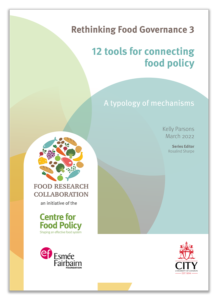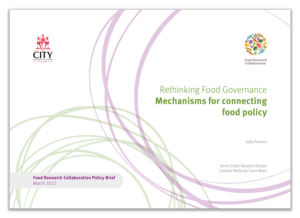Food policy in England has been characterised by complexity (where responsibility for food policy can involve 16 different departments) and by fragmentation (where policy-making needs to be connected across departments, so that policies work together and achieve benefits across the system). In the final stage of the FRC’s Rethinking Food Governance project, Dr Kelly Parsons examines the specific mechanisms that can help stimulate better connections in food policy, and improve coherence and effectiveness.
The report analyses which mechanisms can be used to coordinate food policy across government departments. Through literature reviews, empirical mapping, and qualitative interviews with senior stakeholders, Dr Parsons presents a typology of 12 mechanisms. The mechanisms identified in the report range from soft, informal communicative mechanisms (such as personal connections and interactions between offices); ‘business-as-usual’ cross-cutting work within government structures; through to harder, formalised mechanisms (such as introducing legislative requirements, budgeting, and redesigning ministerial portfolios or reallocating departmental responsibilities).
Dr Parsons concludes that two ‘enabling conditions’ seem to be vital for these mechanisms to be effective. The first is political (and beyond it public) support, and the second is capacity for connected policy-making. Political support within government can be decisive in driving change; and public support can enable wide acceptance of policy intervention, and a broad ‘coordinative culture’ can provide policymakers with the skills and opportunities to address England’s food policy in a truly holistic way.



